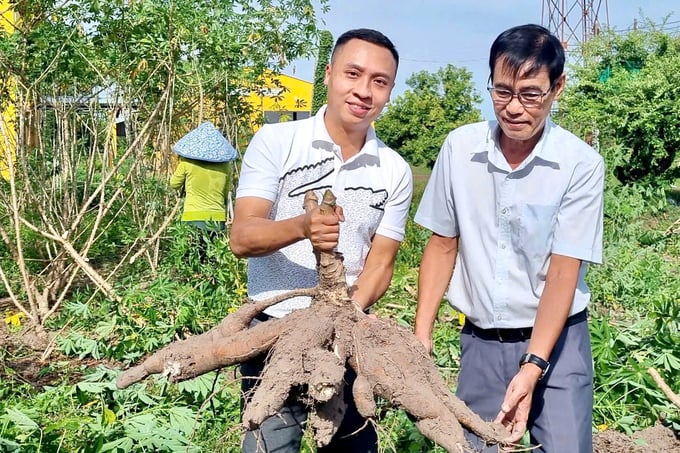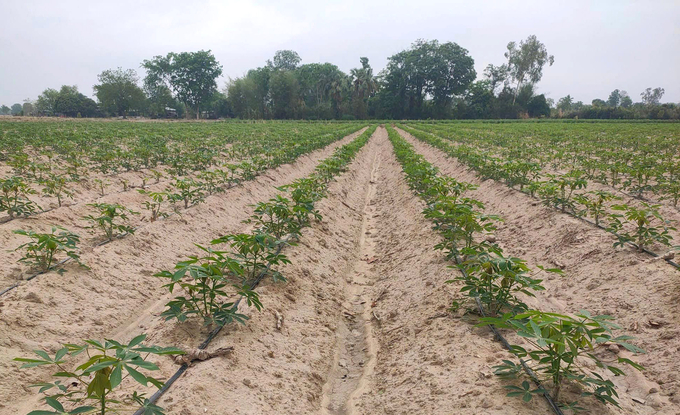June 17, 2025 | 16:39 GMT +7
June 17, 2025 | 16:39 GMT +7
Hotline: 0913.378.918
June 17, 2025 | 16:39 GMT +7
Hotline: 0913.378.918

Cassava in Tay Ninh province. Photo: Tran Phi.
At the workshop "Enhancing Cassava Cultivation Value - Increasing Yield and Starch Content", held by the Tay Ninh Agricultural Extension Center in collaboration with the Farmers' Association and the Tan Chau Agricultural Extension Station on October 15, Dr. Nguyen Trong Hien from the Institute of Food Crops and Vegetables shared insights on the current situation of cassava production and some sustainable development solutions for cassava (manioc) in Tay Ninh, the second-largest cassava-growing province in the country.
In his presentation, Dr. Hien proposed solutions to reduce emissions in cassava farming. Specifically, in agriculture, there are three major greenhouse gases: methane (CH4), nitrous oxide (N2O), and CO2.
Methane (CH4) often arises in agricultural systems when organic matter decomposes under anaerobic (oxygen-poor) conditions, such as in inefficient irrigation systems or wetland areas.
To reduce CH4 emissions in cassava farming, water management should be optimized. This includes avoiding waterlogging and ensuring irrigation systems are well-managed to prevent anaerobic conditions in the soil. Drip irrigation or spray irrigation techniques can help control water usage more effectively. Additionally, using foliar fertilizers like Plantagreenpower (PGP) can reduce water usage by 30-50%.
Biological treatment of cassava residues, such as aerobic composting, can also reduce CH4 emissions. Instead of leaving cassava roots, leaves, and stems to decompose anaerobically in the field after harvest, these can be collected, ground, and composted to produce organic microbial fertilizer, reducing CH4 emissions during decomposition.
In the early stages of cassava cultivation, if farmers intercrop with legumes or vetiver grass, this also helps absorb CH4, reducing the amount of emissions from the soil.

Drip irrigation system installed on a cassava field in Tay Ninh province. Photo: Tran Phi.
N2O mainly results from the use of nitrogen-based chemical fertilizers. The decomposition of nitrogen compounds in fertilizers generates N2O, a potent greenhouse gas.
To reduce N2O emissions, cassava farmers should apply fertilizers efficiently. This involves reducing nitrogen fertilizer usage by analyzing soil and only applying fertilizers when necessary. Fertilizers should be applied at the right time, in line with the plant’s growth needs.
Using slow-release or pelletized fertilizers can reduce nitrogen loss and, consequently, N2O emissions.
Intercropping with legumes, which naturally fix nitrogen from the air, helps reduce the need for chemical fertilizers and reduces N2O emissions from their use.
Increasing the use of organic and green manure can improve soil health, enhance soil structure, and increase nitrogen retention, further reducing N2O emissions.
C2O is commonly emitted from plant respiration, energy use, machinery operation, soil treatment, and chemical fertilizer use.
To reduce CO2 emissions, farmers should substitute chemical fertilizers with organic fertilizers in cassava cultivation. Organic fertilizers improve soil health, enhance carbon storage in the soil, and reduce the need for chemical fertilizers, which emit CO2 during production.
Reducing tillage can decrease organic matter decomposition, thus lowering CO2 emissions. Less tilling also helps increase carbon storage in the soil.
Using renewable energy sources like solar or wind power in irrigation and machinery operations can replace fossil fuels.
Cover crops can protect the soil, reduce carbon loss due to erosion and oxidation, and help retain carbon in the ecosystem over the long term.
Translated by Kieu Chi
/2025/06/12/3721-2-202745_83.jpg)
(VAN) TH made an impression at Seoul Food 2025 with its line of natural beverages, paving the way for Vietnamese food products to enter the South Korean market.

(VAN) Soc Trang's success in rice exports stems from a strategy of developing fragrant and specialty rice cultivation areas and standardizing production toward low-emission practices.
/2025/06/11/1311-5-120811_839.jpg)
(VAN) The pig farming industry is facing the challenge of comprehensive restructuring to meet requirements for quality, safety, traceability, and market expansion both domestically and for export.

(VAN) Vietnam considers participating in ALGROALBA in order to expand agricultural production, coordinate the assessment and effective exploitation potential land.
/2025/06/05/5314-1-184727_407.jpg)
(VAN) From seemingly worthless fish scales and skin, enzymes and lactic ferments can transform by-products into peptides, opening a sustainable, effective business direction and elevating Vietnamese seafood.

(VAN) TTC AgriS and IFC signed a strategic partnership to develop a sustainable agricultural value chain, aiming to achieve the Net Zero target by 2035.

(VAN) Seafood by-products are opening a new path, combining green growth and technological innovation to enhance the industry's value.